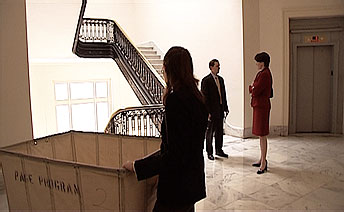

It crept up on us. Through the '80s and the beginning of the '90s, the American economy grew fast. Far more jobs were created than the American workforce could handle -- and the work visa program for foreigners was laughably small. Illegal workers were welcomed in to a country that needed hard working people at every level of the economy. There was little enforcement at the border, and less inside the country. A tattered "keep out" sign at the border, and a "welcome sign" after that. Pretty soon, millions of people were here illegally.
Before it hit the headlines, before most of us even noticed "illegal immigration", a few people in policy positions and think tanks knew we had a problem.
At the beginning of 2001, they hit on a solution. They called it "the Grand Bargain", an agreement that would bring the system into harmony with reality and, they said, solve illegal immigration. The deal would also, inevitably, change the rules of the game for everyone. Now the problem was -- how to turn that idea into the law of the land.
The bargain was great -- except it required each of the big players in immigration to give up something to get what they wanted. Business, labor and immigrants rights advocates all had to be partners. And because the bargain was so all encompassing, everyone understood it had to be bipartisan. For the Grand Bargain to become law, Democrats and Republicans had to make the deal with the other groups, together.
So, you might say, as the century began, they had dreamed up the perfect test of our whole democratic process. This Series is the story of that test.
Comprehensive Immigration Reform -- The Executive Summary
The Grand Bargain is called Comprehensive Immigration Reform, and it re-imagines the whole immigration system. The goal is to create enough visas for the workers the economy needs, no more, and then make it easy for them to come to work legally. If workers decide to stay in the US, there would be rules and a fair system to make that possible for some. Security-wise, the orderly plan would make it much easier to concentrate on the tiny number of terrorists coming to do us harm. The plan has four interlocking parts:
Tougher enforcement at the Border. The idea would be to limit migration to only those people holding valid visas. All other access would be denied. The Advocates hate this, Labor likes it.
Tougher Enforcement at the Workplace. Once business has a reasonable way to find and keep workers, very tough penalties for cheating makes sure they don't undercut wages of American workers. Labor likes this, Business hates it.
Temporary "Guest" Workers. A market-driven visa program would make it easy for business to get foreign labor on an as-needed basis. Business likes this, Labor and the Advocates hate it, fearing wages will be undercut and workers exploited.
Dealing with Those Millions Already Here. This gets called 'amnesty' by critics, 'earned legalization' by supporters. Who gets to stay and who must go back is a sticky human problem. Business, Labor and the Advocates -- in different ways -- see benefits to being generous but the question is always what is politically possible. The answer will change as the years go on.











